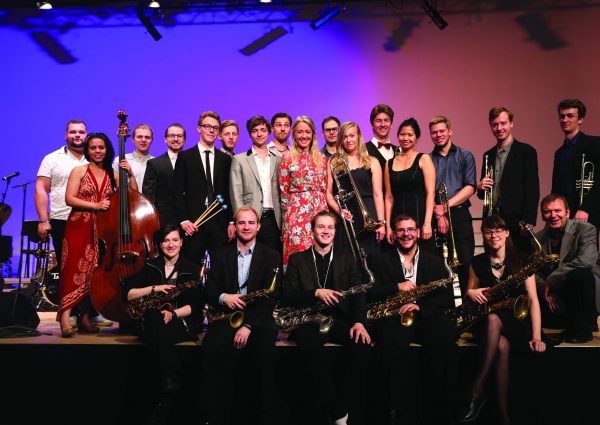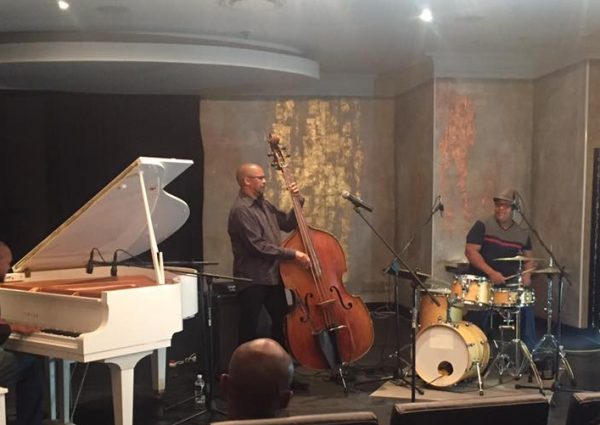The Performing Arts Centre of the Free State presented its marque production Thaba Bosiu – The Musical, written and directed by Napo Masheane, at the tail end of heritage month. The musical, ostensibly about the formation of the Basotho nation, piqued the treehugger in Mpho Matsitle.
Thobela ke re a lotsha
Walking the garden of my plantation recently, I discovered a mulberry tree. I have been having my lunch in this garden almost everyday for over the better part of two years, and I had never noticed the tree before. The tree, as may be the case for many, is a treasure trove of childhood memories. It was one of the things we looked forward to most in summer. However, through no fault of my own, I recently learnt that the tree is an invasive plant.
Growing up in a small mining town with a healthy population of Basotho migrant workers, the story of Thaba Bosiu is one that also colours one’s childhood memories. The most treasured fable of that cradle of the Basotho nation was that the magical mountain disappears at night, protecting its inhabitants from attacks. Either through Famo musicians at the taxi rank, an inebriated neighbour from ‘Moseja’ (as we referred to Lesotho), or through the broken telephone of boys in the hood ‘telling war stories’, the mountain grew fantastically large in one’s imagination. All of that, however, scantily prepared me for Napo Masheane’s Thaba Bosiu – The Musical.
Ons balakatha!
The theatre currently known as the Sand du Plessis Theatre, which sits front opposite the seat of power in the Free State, is not the usual stomping ground for black theatre. That, and the fact that the musical was billed for an eight-day run, a feat unheard of and desperately needed at Pacofs, coupled with the opening speech by the CEO, told us everything we needed to know about the faith the institution had in the show. The jury is still out as to whether that faith was merited (in an another welcomed first, Pacofs conducted a survey of the audience’s thoughts on the musical).
Throngs of patrons, some in ‘traditional’ attire, invaded the nine-hundred-seater theatre for opening night, threatening to fill it up. When the formalities finally came to pass, the curtain was lifted and the Jaziel Brothers’ arranged music filled the theatre. Mangaung’s uber bassist Plaatje Tsepo’s bassline couldn’t be missed. Neither could one miss the imposing figure of Tseko Thukani, as Moshoeshoe, leading the party arriving at Thaba Bosiu on that fateful night of July 1824. To gain access to the mountain, they’re required to present their bona fides before the Thaba Bosiu can grant them refuge:
“O tswa kae?” The mountain demands, much like a xenophobic, irritable immigration officer on a double shift, weeks away from payday.
“Ha mantilatilane.” Each hopeful diffidently replies.
“Wa ja eng?” The screening continues.
“Bohobe.”
“Wa futswela ka eng?”
“Metsi a pula.”
“Thella he re utlwe?”
Moshoeshoe, née Lepoqo, then just a chief of Bamokoteli, a sub-clan of Bakwena, is first to make his case to the mountain:
“Ke nna Moshoeshoe Moshoashoaila wa ha Kali,
Lebeola le beotseng Ramonaheng ditedu;
Le ho hola, ha di eso hole,
Di ya sala, di hola maisao.” (Tśiu, 2008: 25)
The war-dispersed disparate clans that have hitched their fortunes on his wagon follow suit with their own clan praises to announce their arrival to the mountain, and the ululating audience. Among them are Bafokeng ba sa nameleng fatshe, Makgolokwe mahlaba kgoho ka lemao sebonong, Barolong babina tshipi ha go le tlala, babina tholo ha go le kgora, BoMotebang ba Napo maila ho ngwathelwa, and even Matebele a kobo di pedi ho apesa boroko le ho apesa bosodu. Having heard all their cases, Thaba Bosiu approves their applications for asylum.

Boraro bo Teroneng
In the musical, Thaba Bosiu is anthropomorphised as a trinity of women – three coequal, coeternal, consubstantial, divine women. They are rudely awakened by Moshoeshoe’s caravan in the middle of the night. Matwetwe, Moshoeshoe’s spiritual tzar, who is familiar with Thaba Bosiu, is asked to account for such an uncouth intrusion. He profusely apologises and successfully pleads for their case to be heard, the unholy hour notwithstanding.
It is at this early stage that a rift is first seen in the trinity. The debate, as to whether to accept the refugees displaced by Difaqane, the “period, roughly 1822-1833, during which the various clans of the central plateau of the sub-continent were alternately invaded and ruined by successive invasions (Tśiu, 2008: 21)”, is lively, fierce, and helluva hilarious.
Thaba Bosiu, as a trinity of women, equally expresses this invasion in gendered terms. In a series of well-textured sexual innuendos, accepting Moshoeshoe and his followers to climb atop the mountain is analogized as accepting a man as a mate. Is he worth it? Should he ‘get it’? Would it be mutually beneficial or just a case of ‘wham bam thank you ma’am’?
A warning, a reminder, is sounded by Shweshwe, a member of the trinity, akin to The Matrix’s Agent Smith that humans are a plague:
“Every mammal on this planet instinctively develops a natural equilibrium with the surrounding environment but you humans do not. You move to an area and you multiply and multiply until every natural resource is consumed. The only way you can survive is to spread to another area. There is another organism on this planet that follows the same pattern. Do you know what it is? A virus. Human beings are a disease, a cancer of this planet.”
“M.O.T.H.O!” one unit of the trinity spells out the danger to her fellow tripartite alliance members, lest they forget who exactly they’re considering letting in. “O mo tshabe motho!”
Humanity ha se Botho
Notwithstanding that Shweshwe was eventually proven right – the newly-formed Basotho nation decimated the natural habitat of Thaba Bosiu, leaving her land barren and her streams dry – one must consider how the would-be Basotho nation wound up begging for asylum at Thaba Bosiu’s foot.
The period of Difaqane could have been a family squabble that was resolved amicably had it not been for the brutal invasion of the Europeans, so described by Ntjapedi:
“O kile a fihla mautla a leferekwa le boleke ba mafura a nts’a re dikgadika ha di a lekana. Le nahanneng nna ke lakatsa dikgopo tsa kafore. Satane a tshosa bana, monyane a tswa le mona. Ngwana a sala a nyanya letswele mmae a shwele.”
The teachings of Afropessimism remind us that the concept of Humanity or Humans was designed without Africans – Batho – in mind. The colonisers who consolidated the stolen property known today as the United States of America claimed that ‘all men are created equal’ while owning slaves. The Matrix is a cultural product of this same humanity, the human history Agent Smith refers to is of Europeans and their offshoots in the stolen lands of the Americas and Australasia. It is them that have been a cancer to the planet. And to its peoples – having genocided, enslaved, colonised, and undeveloped billions of people throughout history. Whereas Botho has always maintained that “natural equilibrium with the surrounding environment”. Now one ought to ask if the environmental degradation of Thaba Bosiu was due to M.O.T.H.O or H.U.M.A.N.
The legend of Thaba Bosiu, arriving to us primarily through odes to King Moshoeshoe’s famed diplomacy and military ingenuity, speaks of the many battles ‘won’ against the invading Europeans. What is often missed in this romanticisation is that with each ‘victory’, the Basotho were left with less land and less livestock. As per the treaty of Thaba-Bosiu or Khotso ya Mabele, “Moshoeshoe agreed … to deliver 3,000 head of cattle … and to accept the boundaries determined” by the coloniser Jan Fick (Tśiu, 2008: 50).
The constant bombardment of Thaba Bosiu and encroachment of land is akin to what is taking place in Gaza today to the Palestinians. With such losses mounting, it is no wonder that Basotho, increasingly squeezed, overfarmed and overgrazed Thaba Bosiu until she could no longer breathe.
Thaba Bosiu, however, knowing only of the Basotho, and knowing only that all her troubles began the day she opened her arms to them, exacts her revenge on them, with a view of expelling them from her bosom. Her teat dries up, she refuses Basotho sustenance. Crops and livestock die in the numbers, famine sets in, and if some rumours are to be entertained, the era of madimo – cannibals – begins.
Here the musical reminds us of the many man-made natural disasters that have hit Africa and the global south, Batho, due to havoc wrecked on the climate by the West, Humans.

Sekgowa as an invasion
Thaba Bosiu clearly does not want to be accused as an over glorification of the great Moshoeshoe of folklore. In a beautiful scene where he is confronted by Queen-regent Manthatisi, she of Batlokoa ba ho nyela mokopu wa Mmamohato, Moshoeshoe’s weakness as an unwitting collaborator with colonisation is exposed. In this confrontation, Manthatisi like Moruti Tšiu (2008: 73) accuses Moshoeshoe, who is now dressed as a British aristocrat, as a person who “seems genuinely to have believed that as a result of the missionaries’ teachings, his people would abandon Sesotho, their own way of life, and adopt Sekgowa instead.” Enraged, Moshoeshoe engages in a physical confrontation with the warrior queen, and is bested.
The sell-out tag, or more aptly ‘turncoat’ for this comical Moshoeshoe in a tophat, is extremely attractive at this point.
Referring to alien invasive plants such as my beloved mulberry, scientists remind us that these species lack natural defences and therefore become “a threat to local biodiversity and economic activity (Molefe et al, 2019).” More instructively to the discussion at hand, they go on: “The major problem with invasive plants is that, with the lack of control mechanisms normally experienced in the native range, they often outcompete native plants. Some of these alien plants become successful invaders because of their mutualistic relationship with native frugivores (Molefe et al, 2019).”
The role of Moshoeshoe in the dispersal of alien ideas – Sekgowa – is well-documented, and one that by all accounts he was proud of. A sympathetic reading is that he sought, as a diplomat, to marry Sesotho and Sekgowa, synthesising the best of the two civilisations for the greater good of his people, as opposed to the reading by Tšiu that he sought to supplant Sesotho with Sekgowa. However, even within this ambit of the generous reading, Moshoeshoe sorely missed the teachings of Agent Smith of Western modernity, Sekgowa, as a virus and of Molefe et al., contending that it’s an alien invasive species only intent on outcompeting Sesotho. Equally, what “control mechanisms” were available to Moshoeshoe to halt the spread of this invasive species, what Ntjapedi called ‘role le lekhubedu?
Instead of a turncoat, was he perhaps not as innocent and naive as the native frugivore birds that consume and spread alien plants? To stretch this line of inquiry further; does Sekgowa, like the mulberry tree, not address the immediate tangible problem (hunger), albeit creating a long-term abstract problem (destroying local biodiversity)?
Accepting the invasive western modernity, for many, including Moshoeshoe, was preferable to the guaranteed genocide, which has always been the price to pay for rejecting such a self-righteous modernity.
Go tswa ka makgoro ha se go latlhana
Napo Masheane’s Thaba Bosiu – The Musical complicated the folklore many of us thought we were familiar with. The musical proved true Chepape Makgato’s (2022: 13) assertion that “art can be used as a powerful tool that carries memory and restages the narrative of long gone centuries. With memory as a weapon, an artist [can] create things as they are to craft a record for the future generations or deliberately frame the past narratives in different or unexpected manner to change the way [we] see history.” The genius of casting the mountain as a trinity of women – who all at once represented Sesotho/Botho, Mother Nature, and Womanhood and their concomitant invasions and degradations by Sekgowa/Modernity, humans, and men – cannot be overstated.
Apart from questions of ecology and modernity briefly explored in this review, the role of women in our mythmaking is another subject worth enquiry. Both Manthatisi and the seer Mantsopa, who are equally important to the formation of this nation, only get cameo appearances in the musical. Makgato (2022: 10) does well to remind us that Manthatisi’s “contemporaries include [Amahlubi king] Mpangazitha and King Moshoeshoe… Yet, despite Manthatisi’s impact on the socio-political discourse of her era, she is described scantily and problematically.” Makgato further insists that where history has proven itself untrustworthy with such a task, art has to step in to control the narrative, echoing rapper Mo’lemi who quipped, “if those who are responsible and have the power to be recording proper history are not doing it, then those who keep street history will tell the story they way they see it. We have a story to tell and we’ll tell it whichever way we want.”
Eventually the last note was played, and after curtain call, a round of impromptu thank you notes and reading out of credits was received with thunderous applause. As we filled out the plush carpet theatre, the cantankerous among us raised a question of fairness, as any theatre lover would love to see other plays enjoy the same extended run instead of the usual two-night stand. Another quipped that Shaka Ilembe has shown the beauty of telling our stories, especially in Heritage month, in our languages. The use of English in Thaba Bosiu – The Musical wouldn’t help a non-Sesotho speaker to follow the story, so it felt more like an intrusion than anything else. Especially given that the thespians’ tongues were seemingly more comfortable with Sesotho. The hodgepodge music, which at turns took a pop bend and even ventured into opera, felt out of place, especially considering the rich and varied genres of Sesotho music. And, genre aside, very seldomly did the music advance the story.
However, for the most part many seemed pleased and excited about the show. My date on the night, having scored free tickets, went back for seconds, dragging along a few friends. Such was the allure of the musical. And to my fortune, the national environmental management biodiversity act doesn’t require the removal and destruction of my beloved mulberry tree as it is a low category invasive species. I look forward to staining my shirts with its sweet nectar. It does, however, as does Thaba Bosiu – The Musical, make one think about the true nature of the memories we hold dear.
References:
Tśiu, W.M., ‘Basotho Oral Poetry at The Beginning of the 21st Century’, 2008.
Molefe, K.L., Tedder, M.J., Thabethe, V. et al., ‘Role of Native Avian Frugivores in Germination Facilitation and Potential Dispersal of Invasive American Bramble In South Africa’, 2019.
Makgato, C.F., ‘Re-visiting the Understudied ‘Tale’ of the 19th Century African Queen of Batlokwa – Manthatisi Mosanyane Mokotjo’, 2022.
FEATURED IMAGE: Queen Manthatisi confronts King Moshoeshoe. Source: Pacofs Facebook page.






